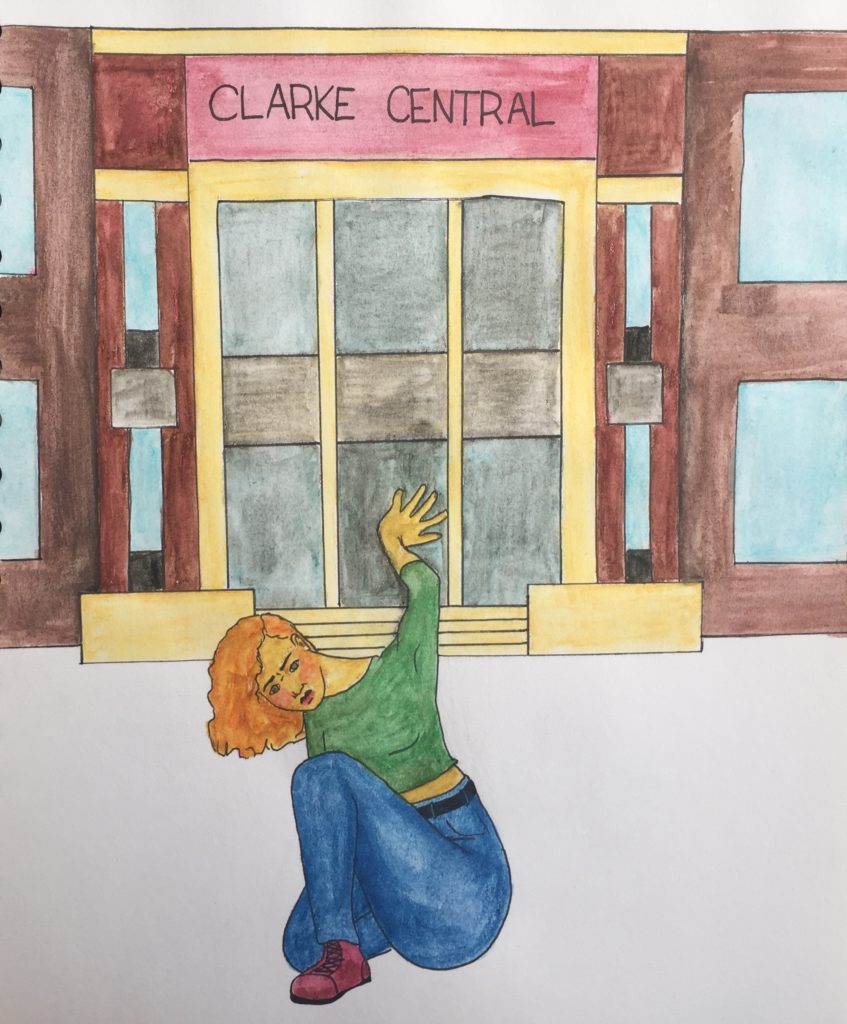A girl is overwhelmed by the weight of the school on her shoulders. This pressure represents the stress students often find themselves under. Illustration by Shea Peters
The pressures and expectations of adolescent life can cause intense stress in many teens. Schools have a moral obligation to address and educate students on stress management.
Long nights. Caffeine hangovers. Frantically finishing assignments at the start of class.
Be it struggling to maintain decent grades, attempting to balance a social life and extracurriculars, or a combination of the three, many teenagers have felt a conflict between maintaining their schoolwork and their mental health at some point in their lives.
In an excerpt of “The Teen Years Explained: A Guide to Healthy Adolescent Development” by Clea McNeely, MA, DrPH and Jayne Blanchard states that “juggling school, sports, after-school activities, social life, and family obligations” can be stressors for high school students.
The brain reacts to stressors by releasing adrenaline and cortisol, according to the National Center for Biotechnical Information. These hormones prepare the body for handling perceived danger by increasing blood pressure, heart rate and metabolism.
While these natural responses are appropriate in dangerous situations, when prolonged they can “increase anxiety, alter mood, and decrease memory and cognitive flexibility,” according to the NCBI.
This means that contrary to its intention of education, the pressure school places on students causes them to have decreased mental performance.
The issues caused by stress only compound as they continue. “How Stress Affects Your Health,” an article published by the American Psychological Association, cited chronic stress as the cause of both mental and physical problems, ranging from headaches to cardiovascular illness. The article also discusses how stress can prolong recovery from sickness.
Some may argue that the pressure school places on students is positive, because time and stress management are a critical set of skills that are highly applicable in the real world.
However, according to a recent study by the University of California Berkeley, “people suffering chronic stress are prone to mental problems such as anxiety and mood disorders later in life.” The negative effects of the stress school places on teenagers outweighs the benefits.
The study also attributes emotional duress as being a cause of increased reactivity to future incidents of fear and anxiety. In other words, stress breeds stress, overwhelming young minds with unnecessary and excessive worry in a vicious cycle.
Fortunately, according to the NCBI, these negative effects are usually reversible. The plasticity of the brain ensures that it can recover. However, the best way to protect from the lasting effects of stress is to prevent it.
More needs to be done in the CCHS community to address student stress levels. The mental health of students can work in tandem with schools, but for that to happen, things need to change to be more considerate of students’ well being.
CCHS staff and administrators can do this by addressing mental health regularly and directly in advisement and in the classroom. While suicide awareness and prevention talks that CCHS counselors are now providing to freshmen are a start, more should be done to become inclusive in overall stress management. These measures could help students learn to control stress levels and recognize when they are at risk.
With an environment focused on improving and preparing young adults to face their futures, it is crucial that schools educate students on managing stress.

1 comment
tamoxifen
Comments are closed.